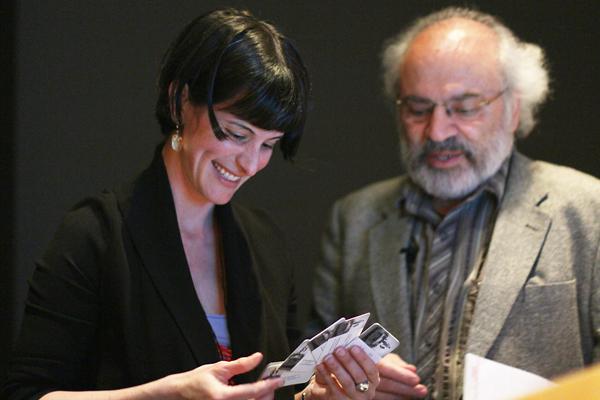
When photojournalist Scout Tufankjian heard in early 2011 that clashes were breaking out in Egypt, she immediately got on a plane and flew there to take pictures of the revolution.
Tufankjian, who spoke about her experience to a group of about 25 Northwestern students and faculty members in the McCormick Tribune Center Forum on Wednesday, is also known for her photographs of President Barack Obama during the 2008 campaign. She emphasized making quick judgement calls during the Admiral Weber Lecture Series, an annual speakership event that memorializes an NU chief council and legal adviser.
“On the first day of the clash in the square, I was down on the street taking pictures and everyone said, ‘You’re absolutely out of your mind, get back in the hotel,'” Tufankjian said. “That’s one of the things you have to judge as a photojournalist, when to stay and when to go.”
Tufankjian told the story of her experience in Egypt from the time she arrived until former President Hosni Mubarak’s resignation. As she spoke, she clicked through a slideshow of the photographs she took.
When the barricades had formed and it became apparent that the protest in Tahrir Square was not a gunfire situation, Tufankjian returned to the square to take more photographs, taking notice of who the protestors were.
“This wasn’t just street thugs who were fighting the police,” Tufankjian said. “These were university students, businessmen. You’d go out there and you’d see people reading newspapers.”
As the days passed, more and more people gathered in the square, until it “became more of a celebration,” she said.
“People were living in the square,” Tufankjian said. “Parents were worried about their daughters going to the square — not that anything was going to happen to them, but that they were going to meet boys.”
When Mubarak came out on the revolution’s 17th day and refused to resign, Tufankjian said the crowd erupted with anger. But instead of giving up and going home, she said the protestors only grew in number. On the 18th day, when then-Vice President Omar Suleiman announced that Mubarak had stepped down, Tufankjian said she was surrounded by an overwhelming sense of joy.
“I’ve photographed amazing people doing amazing things, but this was the best 18 days of my journalistic career,” Tufankjian said.
Tufankjian’s speech was followed by a question-and-answer session moderated by Communication Prof. Hamid Naficy.
Weinberg senior Tim Garrett said he attended the lecture because he has personal interest in the Egyptian Revolution.
“In two days, I’m turning in my senior thesis, which deals with the revolution,” Garrett said. “I’m so used to approaching it from an academic viewpoint. It was interesting to hear it from the perspective of someone who didn’t have that background.”
The Admiral Weber Lecture Series, which has showcased a wide range of speakers including politicians, academics and policymakers, is designed to bring “interesting people with interesting stories” to NU, said political science Prof. Ian Hurd, who helped select this year’s speaker.
“I encountered (Tufankjian’s) work and I was really impressed by it,” Hurd said. “We thought it would be great to have someone who can talk about Egyptian politics from the perspective of someone was actually there.”






